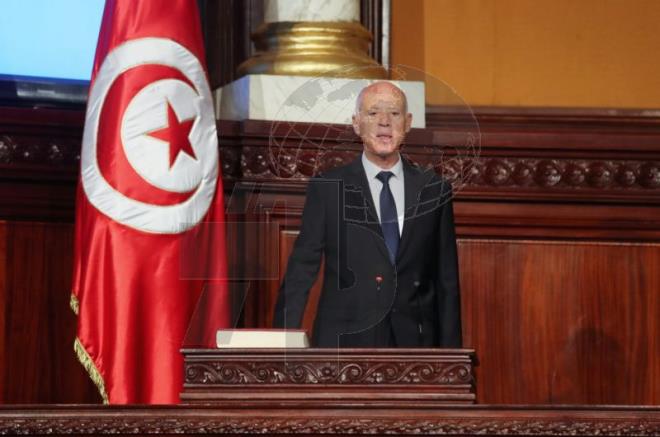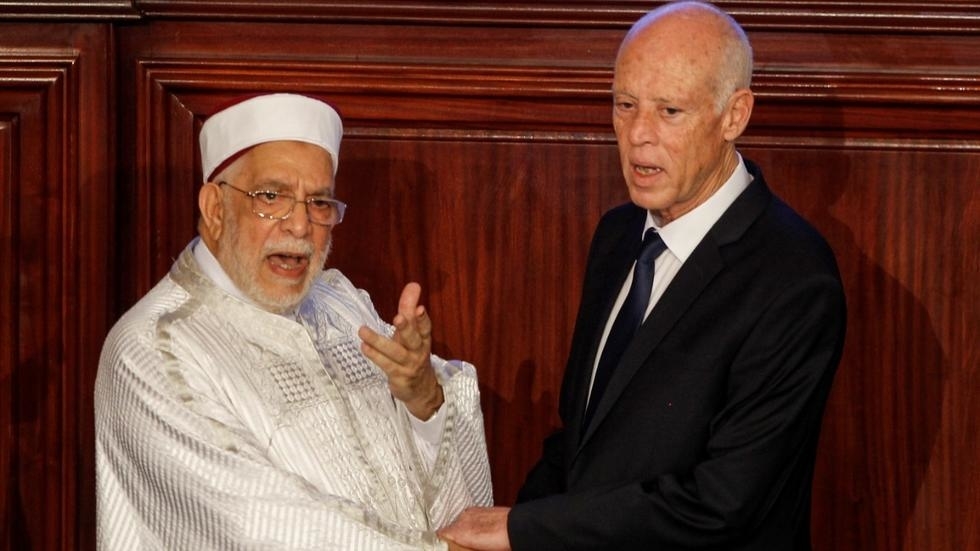www.aljazeerah.info
News, October 2019
Archives
Mission & Name
Conflict Terminology
Editorials
Gaza Holocaust
Gulf War
Isdood
Islam
News
News Photos
Opinion Editorials
US Foreign Policy (Dr. El-Najjar's Articles)
www.aljazeerah.info
|
Editorial Note: The following news reports are summaries from original sources. They may also include corrections of Arabic names and political terminology. Comments are in parentheses. |
Tunisians Elect Qays Sa'yid, as 3rd President of the Second Revolutionary Republic
October 25, 2019
Editor's Note:
On October 23, 2019, Tunisia celebrated the inauguration of the third president of the Second Republic (the revolutionary republic), Qays Sa'yid, whose election was a continuation of the success of revolution, which started in December 2010, sparking other revolutions in various Arab states. Arabs everywhere and freedom-loving people around the world rejoiced the event despite reconginzing the difficulties facing him and the Tunisian people.
 |
 |
| Qays Sa'yid, 3rd President of the second Tunisian Republic, taking office on October 23, 2019 |
Qays Sa'yid, 3rd President of the second Tunisian Republic,
shaking hands with Abdul Fattah Mourou, on October 23, 2019 |
Tunisia's new president sworn in after surprise election win
AFP, F24, 23/10/2019Tunisia's elected president Kais Saied shakes hands with Abdelfattah Mourou, vice president of the moderate Islamist Ennahda party, during his swearing-in ceremony at the Assembly of People's Representatives in Tunis, Tunisia October 23, 2019 REUTERS/Zoubeir Souissi Text by: NEWS WIRES
Tunisia's new President Kais Saied took the oath of office on Wednesday after his surprise election victory over champions of the political establishment.
Saied, a conservative academic with no previous political experience who won the overwhelming support of younger voters in an October 13 runoff, was sworn in before members of the constituent assembly and other top state bodies.
The poll followed the death in July of Beji Caid Essebsi, Tunisia's first president freely elected by universal suffrage.
After sweeping 72.71 percent of the vote in this month's runoff, Saied has won a clear mandate to fight corruption and promote social justice, even though his role focuses on security and diplomacy.
A constitutional law professor whose rigid and austere demeanour earned him the nickname "Robocop", Saied has no real experience in foreign policy.
Tunis, which currently chairs the Arab League, could renew diplomatic ties with Syria, severed since 2012, and play a role in the return of the war-torn country to the bloc.
Saied has made strong statements against Israel, considering any ties with the Jewish state to be "high treason" -- an Arab nationalist position that earned him praise among supporters.
While the security situation has significantly improved since a series of high-profile attacks on tourists in 2015, Tunisia has maintained a state of emergency for four years, with assaults against security forces persisting.
On June 27, a suicide attack killed two people in the heart of the capital Tunis, reviving the spectre of violence.
During the campaign debate, Saied said a key to fighting terrorism was education, arguing that improving primary education would "immunise" youth against extremism.
Another significant task he will face is reforming the police force, which was a cog in the dictatorship toppled by the Arab Spring revolt of 2011 and which continues to be accused of human rights abuses.
https://www.france24.com/en/20191023-tunisia-s-new-president-sworn-in-after-surprise-election-win
***
Political outsider Saied sworn in as Tunisia's president
Tarek Amara
October 23, 2019
Kais Saied, a political outsider and retired law professor, was sworn in as Tunisian president on Wednesday after he won a landslide victory in this month’s election.
Saied’s win delivered a heavy blow to a governing elite accused of failing to improve living standards or end corruption since the 2011 revolution that introduced democracy after years of authoritarian rule.
Even with a large mandate, the new president has less direct control of policy than the prime minister and both will quickly face a series of tough challenges including high unemployment rates and fighting corruption.
“There will be no tolerance in wasting any millime (cent) of the money of our people,” Saied said in a speech.
He vowed to protect freedoms, saying: “Those who have nostalgia to go back to the old years only pursue illusions and mirages,” he added.
Tunisia’s president controls foreign and defense policy, governing alongside a prime minister chosen by parliament who has authority over domestic affairs.
But Saied said he envisaged a bigger state role in the economy.
“We are moving from frustration to construction and work,” he added.
Tunisia has a deeply fragmented legislature in which the largest party, the moderate Islamist Ennahda, has only 52 of the 219 seats.
Saied wants Tunisians to elect small local councils based on the character of their representatives rather than party or ideology. They would in turn choose regional representatives who would choose national ones.
Reporting By Tarek Amara; Editing by Jon Boyle, William Maclean
***
The inauguration speech of the new Tunisian President, Qays Sa'yid: Linguistic elequence but without solutions to Tunisia's problems
BBC selective survey of Arabic media, October 24, 2019
كلمة الرئيس التونسي قيس سعيد بين "بلاغة اللغة" و"غياب الحلول"
قسم المتابعة الإعلامية بي بي سي
24 أكتوبر/ تشرين الأول 2019
اهتمت الصحف العربية بنسختيها الورقية والإلكترونية بالخطاب الذي ألقاه الرئيس التونسي الجديد قيس سعيد عقب أدائه اليمين الدستورية وتسلمه مقاليد الحكم في البرلمان.
وكان قيس سعيد قد ألقى خطابه الأول أمام البرلمان التونسي يوم أمس الأربعاء 23 أكتوبر/تشرين الأول بعد أن فاز على منافسه رجل الأعمال نبيل القروي في مرحلة الإعادة للانتخابات الرئاسية.
"مطمئن للتونسيين، مربك لدولة الفساد"
تحت هذا العنوان، وصف لطفي العربي السنوسي في جريدة الصحافة اليوم التونسية الخطاب الأول لسعيد تحت قبة البرلمان، قائلا: "جاءت كلمته صباح أمس كما كان متوقعاً وكما لم يكن متوقعاً. غلب عليها النزوع الإنشائي أحياناً خاصة كلما تعلق الأمر بالثورة وبإرادة الشعب والمقصود بالإنشائية - هنا - هو ذاك النزوع الأسلوبي الذي لا يخفي عاطفته أو بالأحرى تعاطفه مع المتكلمين باسم الحماسة الثورية وهو -في الواقع- تعاطف مؤقت سينتهي أمام قوة الإكراهات السياسية التي سيواجهها الرئيس فترة حكمه".
ويضيف السنوسي: "خطاب قيس سعيد في مضمونه وفي نبرته يبدو مطمئناً للتونسيين لكنه ـ في العمق ـ غير مطمئن لدولة الفساد وعناوينها".
ويشدد الكاتب أن تونس أصبح فيها "نظام ديمقراطي حقيقي فيه تداول سلمي للسلطة، لا توريث من حوله ولا انقلابات ولا مغامرات ممكنة للاستيلاء على السلطة وكل شيء مرتهن إلى الشعب والقانون والدستور، وأي انقلاب على الشرعية لا يمكن له أن يحدث إلاّ بآليات الشرعية ذاتها.
وفي الصحيفة ذاتها، يقول محمد بوعود إن "ما شدّ التونسيين والمراقبين هي اللغة الجديدة التي تكلم بها الرئيس الجديد، فهم لم يتعودوا على فصاحة في الخطاب ولا على وضوح في الكلمات والجمل والتعبيرات".
ويضيف بوعود "كما أن قدوم الرئيس إلى المجلس لم يكن كما المعتاد فيما عرفناه من سائر الرؤساء السابقين، رجل يخرج من منزله، يسلّم على جيرانه الذين خرجوا يودعونه بالزغاريد والهتافات والنشيد الوطني، يركب سيارة الرئاسة ويتوجه الى قصر باردو".
وفي مجمل تعليقه على الخطاب، يختتم الكاتب بالقول: "لغة قوية ومواقف تبدو واثقة، ومرحلة جديدة يدخلها التونسيون بكثير من الآمال والأحلام، وبرغبة جامحة في تغيير الأوضاع الاقتصادية والاجتماعية وفي النهوض بتونس وإخراجها من مواسم الهرج التي مرّت بها".
" لم تطرح أية حلول"
ومن ناحية أخرى، يناقش محمد أحمد القابسي في العربي الجديد اللندنية المصاعب التي قد يواجهها قيس سعيد وبخاصة في ضوء نتائج الانتخابات البرلمانية التونسية، حيث يقول إن الرئيس سيجد "نفسه بلا كتلة برلمانية تدعمه، ولا حزب يقف وراءه، علاوة على أنه لم يقدّم برنامجاً عملياً يخوض به غمار السلطة، ويمكّنه من إطلاق مبادراتٍ واقعيةٍ تساهم في تغيير الأوضاع الاقتصادية والاجتماعية الصعبة، ما جعل محللين ومتابعين يجمعون على أن ناخبيه، وهم قرابة ثلاثة ملايين، انتخبوا فكرة نبيلة، أو حلماً طوباوياً، ولم ينتخبوا شخصيةً يمكن أن تمارس الحكم حسب برنامج واضح المعالم قد يأخذ طريقه إلى الواقع. ولعل إيغال الرئيس الجديد في سياسة الصمت، وعدم الإفصاح عن رؤاه بوضوح، جعلت كثيرين يتوجهون إليه بتلك المقولة الشهيرة لسقراط 'تكلم حتى أراك'."
وتحت عنوان "تونس نحو دستور جديد يتفق ورؤئ الرئيس الجديد"، كتب محمد علي السقاف في الشرق الأوسط اللندنية مقالاً يتناول فيه تصريحات قيس سعيد حول تغيير النظام الانتخابي القائم في البلاد، حيث يقول: "إذا كان الرئيس قيس سعيد انتقد نظام الانتخاب النسبي، فالسؤال المطروح هل سيكتفي بتغيير النظام الانتخابي عبر آلية القانون فقط؟ أم من الأفضل أيضاً تثبيت نوع النظام الانتخابي الذي سيختاره بنص الدستور مما يتطلب إجراء تعديل دستوري، وهل سيكون مجرد تعديل دستوري أم صياغة دستور جديد؟"
ويضيف الكاتب: "صحيح أن السيد سعيد كمستقل لا يمكنه الاعتماد على أغلبية حزبية، وكما قال إن كتلته هم الشعب وهم الملايين الثلاث الذين انتخبوه وغالبيتهم من الشباب، وهؤلاء هم من سيعتمد عليهم ويدخل تونس في عصر جديد".
كما كتب الحبيب الأسود في العرب اللندنية مقالاً بعنوان "قيس سعيّد: بلاغة اللغة والعاطفة في مواجهة تحديات كبرى"، يقول فيه: "جمع الرئيس التونسي الجديد قيس سعيّد في كلمته أمام برلمان بلاده أمس بين بلاغة اللغة وبلاغة العواطف. كان النص مترف الإيقاع بما يتجاوب مع لكنة صاحبه وجهورية صوته، وكانت العواطف مسيطرة على المضمون، بشكل جعل الكلمة أقرب ما تكون إلى بيان زعيم شعبي أثناء تسلّمه الحكم بعد ثورة قطعت مع ما سبقها".
ويضيف الأسود: "يبدو واضحا أن الرئيس هو من كتب كلمته بنفسه، وكان صارماً في اختيار مفرداته الأولى التي واجه بها الداخل والخارج بعد أدائه القسم، فهو يدرك أن كل كلمة لها أهميتها القصوى في مثل هذه الظروف وفق معايير فهمها لدى الأطراف المتلقية".
ويختتم الكاتب بالقول إن "كلمة سعيّد كانت بليغة اللغة والعواطف، لكنها لم تطرح أية حلول، ولم تصرح بكيفية مواجهة التحديات الكبرى التي تواجهها البلاد، يمكن تفهم ذلك باعتبارها صادرة عن رجل يطرق لأول مرة أبواب الشأن العام والعمل السياسي والوظيفة على مستوى إدارة الدولة، ولكن الأيام القادمة ستكون كفيلة بفهم ما سيتم الاعتماد عليه في ترجمة طوباوية الرئيس الجديد إلى فعل حقيقي على أرض الواقع بتشعباته المختلفة".
https://www.bbc.com/arabic/inthepress-50168150
***
Share the link of this article with your facebook friendsFair Use Notice
This site contains copyrighted material the
use of which has not always been specifically authorized by the copyright
owner. We are making such material available in our efforts to advance
understanding of environmental, political, human rights, economic,
democracy, scientific, and social justice issues, etc. We believe this
constitutes a 'fair use' of any such copyrighted material as provided for
in section 107 of the US Copyright Law. In accordance with Title 17 U.S.C.
Section 107, the material on this site is
distributed without profit to those
who have expressed a prior interest in receiving the included information
for research and educational purposes. For more information go to: http://www.law.cornell.edu/uscode/17/107.shtml.
If you wish to use copyrighted material from this site for purposes of
your own that go beyond 'fair use', you must obtain permission from the
copyright owner.
|
|
|
|
||
|
||||||


